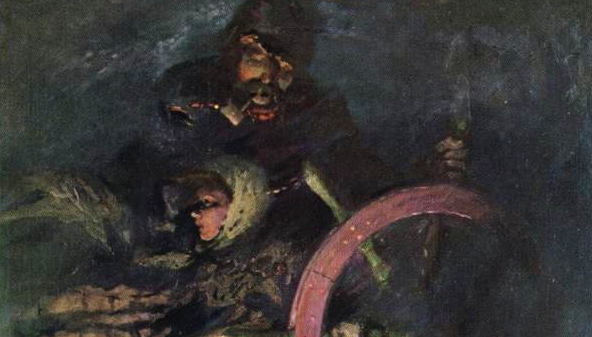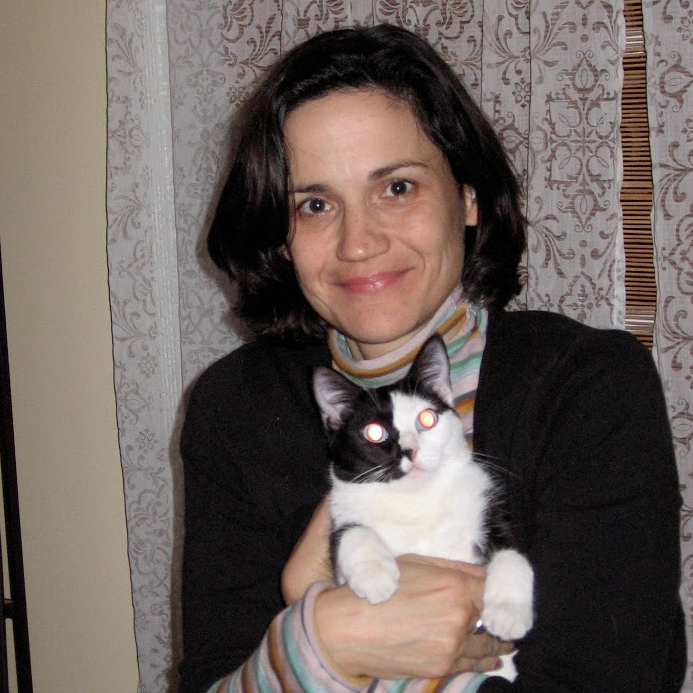Flash Nonfiction by Jocelyn Heaney
My Mother’s “Wreck of the Hesperus”

Another blurred batch of sea poems today. My junior college students filed in, struggling through George Darley’s “The Sea Ritual” or William Whiting’s “The Sailor’s Hymn.” Every year, I ask students to memorize a poem to read aloud in class. I say it’s good to know something by heart, but it’s an ordeal that terrifies and baffles them. Few make it through without long silences.
That none today chose “The Wreck of the Hesperus,” the morbid Longfellow melodrama my mother used to recite, left me vaguely disappointed and relieved. No one could own “Hesperus” like my mother.
The skipper of the Hesperus binds his daughter to the mast during a violent storm. She, being a chatty child, keeps asking the beleaguered old salt questions that he answers until the twelfth stanza:
“O father! I see a gleaming light,
Oh say, what may it be?”
But the father answered never a word,
A frozen corpse was he.
My mother grew up in Salem, Massachusetts, and her accent turned “corpse” to a very earnest “caawpse.” As a child, I had to suppress my laughter, or Ma wouldn’t continue to my favorite part:
Lashed to the helm, all stiff and stark,
With his face turned to the skies,
The lantern gleamed through the gleaming snow
On his fixed and glassy eyes.
I loved the lantern. I loved the snow. I loved the odd repetition of “gleamed” and “gleaming,” and I loved death’s glassy stare.
When I woke this morning, I decided to wear a ring my mother gave me when I was a teenager, a ring I haven’t worn in years. Later, as I listened to my students plod through their poems, I twisted and worried the ring, its stone a murky sea green.
This evening, at a gathering of local writers, I fell into a reverie, staring at a pattern on a cheese plate. It looked like an antique, the type of eighteenth- or nineteenth-century china brought by sea captains from the Far East. A man gazes down from an open window at a garden, where two women appear to be gossiping. A road disappears into the red porcelain distance.
I thought of patterned teapots and plates and keepsake boxes painted with scenes of muted romance. I remembered a thousand thrift stores, yard sales, and auctions, my mother’s difficult life and her simple joys. I was grieving already, as if it could shave off a fraction of future dread.
I thought of her hands. Every time I see her at the nursing home in Peterborough, New Hampshire, I slip some kind of ring on her finger—a ring that’s plain silver or with a green stone. In her confusion, my mother doesn’t always remember who’s alive or dead. She can’t write her name. But she can solve difficult crossword puzzles if I read her the clues, and I bet she still knows Longfellow’s poem.
At daybreak, on the bleak sea-beach,
A fisherman stood aghast,
To see the form of a maiden fair,
Lashed close to a drifting mast.
She once recited it during a power failure on Christmas night. The falling snow outside seemed to match the snow in the poem. The shadowy, candlelit room felt as cavernous as a ship. I don’t remember how far my mother had gone, whether she’d reached the “cruel rocks” or the “bleak sea-beach,” only how startled I felt when the lights came on, how lost.
Publishing Information
- “The Wreck of the Hesperus” by Henry Wadsworth Longfellow, originally published in Ballads and Other Poems (1842).
Art Information
- "The Wreck of the Hesperus" (detail) by S. M. Arthurs from The Children's Own Longfellow, 1908; public domain.
 Jocelyn Heaney is a writer based in Los Angeles. Her work has appeared in the Los Angeles Review of Books, among other places. She holds an MFA from the University of Massachusetts.
Jocelyn Heaney is a writer based in Los Angeles. Her work has appeared in the Los Angeles Review of Books, among other places. She holds an MFA from the University of Massachusetts.
Why is this flash piece nonfiction?
"I needed a form that could tell a story but also convey the emotional intensity of poetry. I also like working within the limitations of a short form that forces the writer to be economical."
